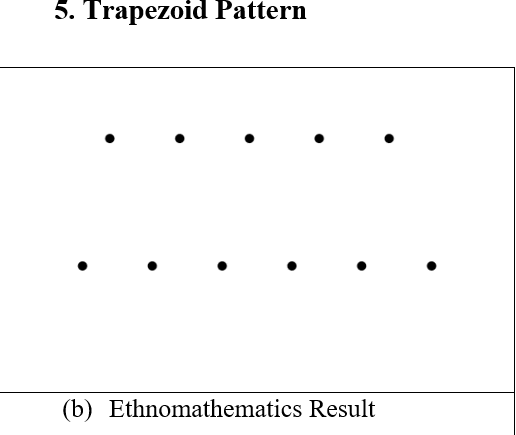Ethnomathematics in Boria dance from Penyengat Island
Etnomatematika pada Tari Boria di Pulau Penyengat
DOI:
https://doi.org/10.31629/jg.v8i2.6637Keywords:
ethnomathematics, Boria dance, mathematical activity, mathematical conceptAbstract
Boria dance is an art from Penyengat Island that shows the skill of marching and dancing to the rhythm of music in various song rhythms. The dance is performed by paying attention to the floor pattern, appropriateness of Movement, and appropriate rhythm. All of this is done to achieve the beauty of the dance. This research examines the ethnomathematics of the Boria dance on Penyengat Island. This research is qualitative research with an ethnographic approach. The data source for this research is arts activists at the Penyengat Heritage Cultural Studio. Data was collected by observation, interviews, and documentation with the main instrument, the researcher himself. Next, data analysis was carried out using domain, taxonomy, component, and cultural theme analysis. The research results found that there were mathematical activities, namely counting the beats made by dancers, measuring the distance between dancers before and after entering the stage, and designing the movements and floor patterns of the Boria Dance. The mathematical concepts in this research are multiplication, non-standard units of measurement, angles, and flat figures.
Downloads
References
Adrian, E. (2018). Upaya Orang Tua dalam Menanggulangi Perilaku Mengkonsumsi Minuman Keras pada Remaja Usia Sekolah di Desa Sungai Batang. Jurnal Pendidikan Sosiologi Dan Humaniora, 9(2), 103–113. https://jurnal.untan.ac.id/index.php/JPSH/article/view/33218
Destrianti, S. (2019). Etnomatematika dalam Seni Tari Kejei Sebagai Kebudayaan Rejang Lebong. Jurnal Equation: Teori Dan Penelitian Pendidikan Matematika, 2(2), 116. https://doi.org/10.29300/equation.v2i2.2316
Fajarini, U. (2014). Peranan Kearifan Lokal Dalam Pendidikan Karakter. SOSIO DIDAKTIKA: Social Science Education Journal, 1(2). https://doi.org/10.15408/sd.v1i2.1225
Harahap, N. (2020). Penelitian Kualitatif (H. Sazali (ed.)).
Malik, A., & Febriyandi, F. (2013). Direktori Potensi Seni dan Budaya Melayu.
Muhammad, I., Marchy, F., & Do Muhamad Naser, A. (2023). Analisis Bibliometrik: Tren Penelitian Etnomatematika dalam Pembelajaran Matematika di Indonesia (2017-2022). Jurnal Ilmiah Pendidikan Matematika), 11(2), 267–279. http://e-journal.unipma.ac.id/index.php/jipm
Nahak, H. M. . (2019). Upaya Melestarikan Budaya Indonesia Di Era Globalisasi. Jurnal Sosiologi Nusantara, 5(1), 65–76. https://doi.org/10.33369/jsn.5.1.65-76
Naja, F. Y., Mei, A., & Sa’o, S. (2021). Eksplorasi Konsep Etnomatematika Pada Gerak Tari Tradisional Suku Lio. AKSIOMA: Jurnal Program Studi Pendidikan Matematika, 10(3), 1836. https://doi.org/10.24127/ajpm.v10i3.3885
Sa’o, S., Mei, A., Bito, G. S., & Mei, M. F. (2022). Eksplorasi Etnomatematika Pola Lantai Pada Formasi Tarian Tea Eku Daerah Nagekeo. AKSIOMA: Jurnal Program Studi Pendidikan Matematika, 11(3), 1760. https://doi.org/10.24127/ajpm.v11i3.5359
Santika, I. F., & Izzati, N. (2023). Interactive PowerPoint Media Based on Problem-Based Learning on Set Material. Jurnal Gantang, 8(1), 1–10. https://doi.org/10.31629/jg.v8i1.5326
Susanta, A., Koto, I., & Susanto, E. (2023). Mathematics PISA Problems Using Local Context for Elementary School Students. Jurnal Gantang, 8(1), 11–19. https://doi.org/10.31629/jg.v8i1.5604
Sutini, A. (2018). Pembelajaran Tari Bagi Anak Usia Dini. Cakrawala Dini: Jurnal Pendidikan Anak Usia Dini, 3(2). https://doi.org/10.17509/cd.v3i2.10333

Downloads
Published
Issue
Section
License
Copyright (c) 2023 Jurnal Gantang

This work is licensed under a Creative Commons Attribution-NonCommercial-ShareAlike 4.0 International License.

















